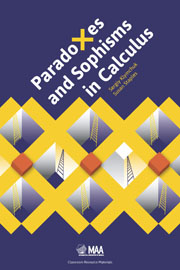
-
The digital format of this book is no longer available to purchase from Cambridge Core. Other formats may be available.
-
Select format
-
- Publisher:
- Mathematical Association of America
- Publication date:
- Invalid date
- May 2013
- ISBN:
- 9780883857816
- Dimensions:
- Weight & Pages:
- Dimensions:
- Weight & Pages:
- 00kg,
- Subjects:
- Mathematics, Real and Complex Analysis
- Series:
- Classroom Resource Materials
You may already have access via personal or institutional login- Subjects:
- Mathematics, Real and Complex Analysis
- Series:
- Classroom Resource Materials
Book description
Paradoxes and Sophisms in Calculus offers a delightful supplementary resource to enhance the study of single variable calculus. By the word paradox the authors mean a surprising, unexpected, counter-intuitive statement that looks invalid, but in fact is true. The word sophism describes intentionally invalid reasoning that looks formally correct, but contains a subtle mistake or flaw. In other words, a sophism is a false proof of an incorrect statement. A collection of over fifty paradoxes and sophisms showcases the subtleties of this subject and leads students to contemplate the underlying concepts. A number of the examples treat historically significant issues that arose in the development of calculus, while others more naturally challenge readers to understand common misconceptions. Sophisms and paradoxes from the areas of functions, limits, derivatives, integrals, sequences, and series are explored. Solutions for each paradox and explanations of the fallacious reasoning in each sophism are provided in later sections. This book serves as a complementary companion to the first authors previous book Counterexamples in Calculus (MAA), recipient of the 2010 Outstanding Academic Title Award from Choice Magazine of the American Library Association.
Contents
Metrics
Altmetric attention score
Full text views
Full text views help Loading metrics...
Loading metrics...
* Views captured on Cambridge Core between #date#. This data will be updated every 24 hours.
Usage data cannot currently be displayed.
Accessibility standard: Unknown
Why this information is here
This section outlines the accessibility features of this content - including support for screen readers, full keyboard navigation and high-contrast display options. This may not be relevant for you.
Accessibility Information
Accessibility compliance for the PDF of this book is currently unknown and may be updated in the future.


